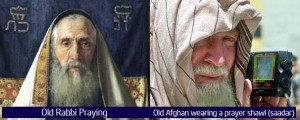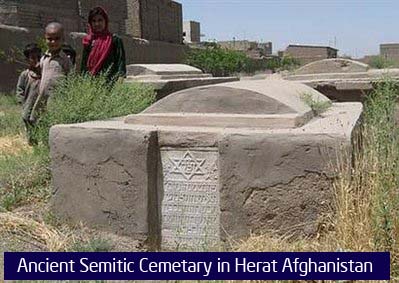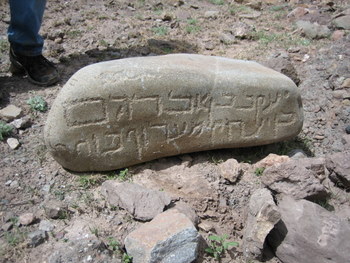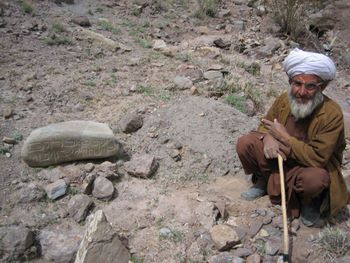Quote:
Just How Similar are Pashtun and Jewish People?
By Yasmin Eliaz, Bar Ilan University
Location Afghanistan Afghanistan April 10, 2014 5:49 pm
The Pashtun people who live in Afghanistan and Pakistan have common historical, linguistic and cultural similarities with Jewish people.

Previously, we have compared the Pashtunwali, an unwritten code of conduct for the Pasthun people of Afghanistan and Pakistan, with the Jewish Torah.
Now we can look for similarities that originate from the Torah or from the Bible that do not have necessarily something in common with the Pashtunwali.
There are some recognized stories of Pashtun practices virtually identical to Jews: Lighting candles on Friday night, separation of meat and dairy, and covering graves with stones.
Moreover, some Pashtu names derive from Hebrew. For example, Asif, Assaf, Binyamin, Kenan, and Barak (Barak is the name of the known Barakzai tribe, which traces after Barak son of Avinoam, officer- warrior of the ancient Israeli Kingdom.
Barak means glance, sparkling, flash. The other names mentioned in the Torah: Asif (harvest in Heberew), Assaf (gather in Hebrew), also known as the compositor of the Levi’s (Liwan tribe) choir, Binyamin (fool of power), the 12th Israeli tribe, and Kenan (lamenter in Hebrew) the fourth generation of the humanity.
These names are quite ordinary in Israel and in Pashtun areas. Names that do not originate from the Torah, like Tameer (high in Hebrew/hideen in Aramaic) and Timor (carved decorating shape of palms found at the Jewish temple), are also common among the two groups, as well as Shir and Sahar.
Religious names and tool share common characteristics.
In Pashtu, names of God are known as Khudai; while in biblical Hebrew God is referred to as (El) Shadai. The Jewish prayer shawl (talit) issue also has a great resemblance to the Pashtu/Urdu word tolia which means towel.
Many Pashtun wear scarves which look like a talit: a wide white scarf decorated with blue stripes on both sides of it. The only thing that is missing in the knotted fringes (tzitzit) attached to its four corners.
Saturday in Pashtu is called Shanbay and Hebrew, Shabbat – the holy day of the week for Jews. During Shabbat, Jews are commanded to abstain from labor and reflect. Shabbat is the Jewish symbol of loyalty for God. In Pashtu, Sabat means loyalty, and on Shanbay work is also not allowed.
Furthermore, Pashtu and Hebrew prefixes originate from the ancient Semitic language Aramaic. For example, the prefix “De” which used in Hebrew and Pashtu literature means “from” or “of.”
There are probably more common words, names and phrases between the Pashtu, which belongs to western Iranian language group, and Hebrew which belongs to west Semitic language group. And yet both groups still have much in common, as the Pashtuns originate from the lost tribes of Israel.
Watch this excerpt from
the Quest for the Lost Tribes of Israel
http://www.sharnoffsglobalviews.com/...ns-jewish-261/
Quote:
Israelis and Taliban Separated at Birth?
Don't tell the Taliban, but their ancestors may be Jewish.
Israel's foreign ministry is funding research into whether members of the ethnic tribe from which the Taliban draws its manpower have Jewish ancestors.
Pashtuns are the largest ethnic community in Afghanistan. It is widely believed they are an offshoot of the Pathans whose members are scattered across northern India and Pakistan. Both are today exclusively Muslim. Neither has any sympathy for modern Israel.
Scientists are now trying to determine whether the Pathans themselves are directly descended from the tribe of Ephraim which was exiled from the land of Israel by the invading Assyrians in 721 B.C. Pathan folklore and culture are filled with references to an Israelite past.
The last king of Afghanistan Zahir Shah who reigned in Kabul until 1973 reportedly claimed his family was descended from what he called the tribe of Benjamin.
The Taliban spare no effort in expressing their hatred for Israel. Any genetic link they may have with people of Jewish descent would be a dark irony.
http://abcnews.go.com/Technology/tal...ory?id=9535559
The Pathan (Suku Pushtun) yang juga mayoritas Muslim, bahkan menjadi tulang punggungnya kelompok garis keras Taliban. Tetapi masih melestarikan Budaya dan Adat-Istiadat bangsa Israel Kuno. Makam Yahudi Kuno dan Aramaic Script yang berusia ribuan tahun, masih mereka jaga kelestariannya.



Dilain pihak, Suku Pushtun "Taliban" menghancur-leburkan Patung Buddha Bamiyan yang bersejarah.
 https://muslimbaniisrael.wordpress.com
https://muslimbaniisrael.wordpress.com
 www.about-afghanistan.com
www.about-afghanistan.com



Nama negara Afhganistan berasal dari nama Malak Afghan, cucu Raja Saul (Talut) dari anak kelimanya, yang bernama Irmia (Yeremia).
The Pathan (Suku Pusthun) bermukim di negara Afghanistan dan Pakistan, berjumlah sekitar 40 jutaan dan di seluruh dunia mencapai angka 50 juta jiwa.
Suku Pushtun berasal dari berbagai suku bangsa Israel (Non Yahudi) "
Ten Lost Tribes of Israel", terutama berasal dari 2 suku bungsu bangsa Israel, yaitu
Suku Ephraim dan
Suku Benyamin (Suku dari PM Israel sekarang, Benyamin Netanyahu)

.
Quote:
Salam dari saudara tua Suku Gad dan Menashe (Timur) yang ada "di pulau-pulau di laut" Nusantara, untuk Suku Ephraim dan Benyamin.

Dirgahayu ke 70 untuk NKRI tercinta !











 .
.




